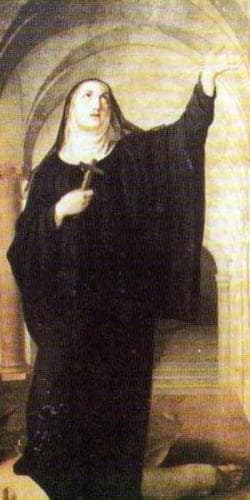
Blessed Eustochium Of Padua
Blessed
Feast Day: February 13
Death: February 13, 1469
Biography
Blessed Eustochium of Padua, also known as Lucrezia Bellini and often referred to as the Cinderella of the Cloister, was born in 1444 at the San Prosdocimo convent in Padua, Italy. Her mother, a nun at the convent, had sadly broken her vow of chastity and as a result, Lucrezia grew up within the walls of the monastery.
From a young age, Lucrezia felt a strong calling to the religious life. However, due to the scandal surrounding her birth, many of the sisters within the convent opposed her decision. Despite the initial opposition, the bishop recognized the authenticity of her vocation and approved her entrance into the novitiate as a Benedictine nun in 1461. It was at this time that she took the name Eustochium, symbolizing her dedication to a life of sanctity.
Unfortunately, Eustochium endured great suffering throughout her life. For four years, she experienced violent and hysterical fits, which were perceived by some as possession. As a result, she was imprisoned, subjected to a regimen of bread and water, periodically starved, and repeatedly exorcised. It is important to note that these beliefs and practices were common during her time.
At one point, when her abbess fell ill, Eustochium was unjustly accused of poisoning her. The townspeople, fueled by fear and rumors, gathered to burn her as a demon. However, she was saved from this fate by the intervention of her confessor and spiritual director, who believed in her sanctity. Despite the hardships she faced, Eustochium remained gentle, pious, patient, and humble, perceiving it all as a form of penance.
Over time, Eustochium's sanctity and unwavering dedication to her vocation won over the hearts of many of the sisters who had initially opposed her. Her confessor and spiritual director continued to support her, advocating for her right to pursue her calling.
Shortly after making her formal vows, Blessed Eustochium of Padua passed away on February 13, 1469, at the San Prosdocimo convent in Padua. A miraculous sign of her union with Christ was discovered after her death: the name of Jesus cauterized on her breast, a testament to her deep devotion and spiritual journey.
Blessed Eustochium of Padua is venerated in Padua for her remarkable faith, perseverance, and holiness. Her story serves as an inspiration to those who face adversity and challenges in their own lives, reminding us of the transformative power of grace and the beauty of a life well-lived in service to God. Although she has not yet been officially beatified or canonized, her story continues to be known and revered among the faithful.